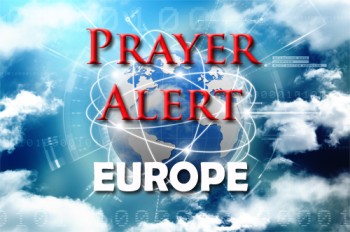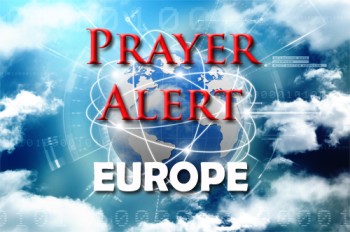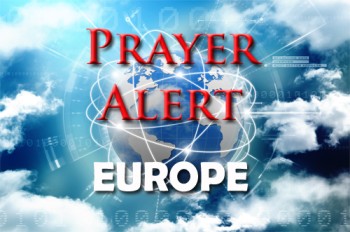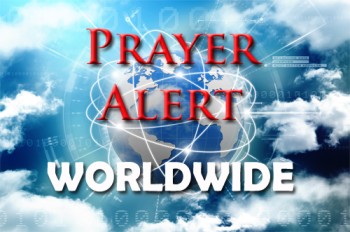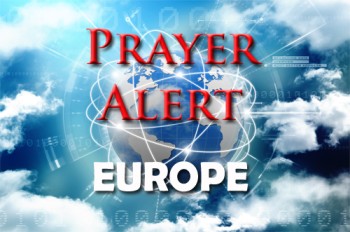Displaying items by tag: Europe
'I'm not courageous, I was called by God'
The general secretary of the Russian Evangelical Alliance said he felt called by God to speak out against the invasion of Ukraine. In an open letter Vitaly Vlasenko said he mourns what Russia has done and shared his sorrow for the victims and those forced to flee Ukraine. He wrote to President Putin twelve hours before the invasion to implore him to think again. He has not received a reply, but he has received letters of support from across the world. ‘They think that I’m really courageous, to openly say something about this, but I’m a simple pastor of the local Baptist Church.’ Vitaly’s parents were children of World War 2 and they told him how tough it was and that nothing is worse than a war. ‘We are in the 21st century and must think differently. We must discuss on a political level with the church, a place of reconciliation, peace and love.’
Ukraine: church believes for miracles
Ukraine’s Christians are praying for God's protection, peace, and His will to be done, seeking Him in churches, bomb shelters, and homes. They are believing for miracles, healing and the supernatural presence of God to manifest itself powerfully throughout Ukraine. There is such faith being exercised, with crying out to God, as shown on videos, that some wonder if the presence and glory of God will become so pervasive that Russian soldiers will kneel down and repent on the battlefield, while Ukrainians extend grace, forgiveness and mercy, showing the love of Christ. In the midst of trial and war, the church is singing. It is standing against the wave of evil, bringing a standard of righteousness and holiness in the midst of calamity. Worship and prayer, spiritual warfare tools, are cutting through the darkness and joining brothers and sisters in Christ worldwide.
Prayer for the Russian people
Pray that the Russian people learn the full truth about the war in Ukraine. Their main source of information comes from state-owned television. There is an increasing awareness of being lied to among the younger people who are active in social media. Truth sets free, and it can set alight a resistance against this war that Putin cannot ignore. Pray for Russian mothers! Sooner or later, the truth about the rising number of Russian casualties must come out. In 1994, after Chechnya tried to gain independence from Russia, the ‘Committee of Soldiers’ Mothers’ opposed the senseless and bloody war and went into the battle zone to confront and negotiate with the military. Many soldiers were released to return home. The Ukrainian government has already called the Russian mothers to come and collect their captured sons. God can raise up the mothers in Russia, once more, as instruments of peace.
Russians in Ukraine kidnap missionary
Orphan's Promise has ministered to the needs of tens of thousands of people across Ukraine for many years. Valentina is an Orphan's Promise aid worker; when Russian troops arrived and learned that she was helping the Ukrainians they kidnapped her. Orphan's Promise provides food and shelter to desperate Ukrainians and shares Jesus with them. Valentina’s team evacuates women, children, the sick and elderly from hot spots. While under fire they drive to bakeries, also working under fire, and deliver bread to hungry people while also providing them with spiritual food. Valentina's friends and colleagues are very concerned for her safety, asking Christians to pray that she will not be tortured and will be released soon. Pray also for all those bringing urgent humanitarian aid to areas which have faced countless air strikes and are now occupied by Russian forces.
NATO extraordinary summit
An extraordinary NATO summit has addressed the most serious security crisis in a generation. NATO's core task was to address the need for a reset of deterrence and the defence of Ukraine in the longer term. Four new battlegroups have been established in the eastern part of the Alliance. There is a new sense of urgency as many countries invest more money in Ukraine and supply essential air, sea and land equipment to defend it and deter attack. President Zelensky, addressing the leaders, asked people everywhere to take to the streets in a show of support for Ukraine to mark one month of the Russian invasion. The UK sanctioned 65 more Russian individuals including the Wagner Group of mercenaries, described as ‘Putin’s private army’. When the NATO meeting ended leaders left for a G7 meeting where sanctions were discussed. See also
Ukraine: instances of divine intervention
In the midst of the current conflict that has brought horrendous suffering to the Ukrainian people, numerous reports are coming through of divine intervention and protection, and specific answers to prayer. There are encouraging testimonies of people being led out of danger shortly before an attack, bombs that fail to explode, enemy forces coming under great confusion, angel formations in the sky, and of God’s tangible presence. A pastor based in Kyiv also noted how very heartening it was to see ‘many people in the Ukrainian army asking for prayer’: see
Ukraine: far-right and anti-Semitism
One of Vladimir Putin’s often-repeated aims is to ‘denazify’ Ukraine. On the face of it, this is absurd, not least because President Zelensky is himself Jewish. Labelling political enemies ‘Nazis’ is also a common political ploy in Russia. Putin’s destructive actions - among them the devastation of Jewish communities - make clear that he is lying when he says his goal is to ensure everyone’s welfare. However, even if his claims may seem absurd propaganda, Ukraine has more neo-Nazi groups than any nation. The best-known of these is Azov, an all-volunteer ultra-nationalist military unit of around 900 which unofficially is part of the parliament.
Russia recruiting mercenaries
Russian social media and private messaging groups are recruiting a brigade of mercenaries to fight in Ukraine alongside the army. The BBC interviewed a serving mercenary and former fighter linked to Russia's leading mercenary organisation who gave details of the recruitment campaign. He said many veterans of the secretive Wagner organisation were contacted on a private Telegram group a few weeks before the start of the war and invited to ‘picnic in Ukraine’, with references to tasting ‘Salo’, a pork fat traditionally eaten in Ukraine. The message appealed to ‘those with criminal records, debts, banned from mercenary groups or without an external passport’ to apply; plus ‘those from the Russian-occupied areas of Luhansk and Donetsk republics and Crimea are cordially invited’. The Wagner group, a most secretive Russian organisation, officially does not exist. Serving as a mercenary is against Russian and international law. Recruits are placed in units under officers from the GRU (Russian military intelligence unit).
Moments of light fleeing Kyiv
Christiana Moon, a YWAM missionary from Essex who fled from Kyiv, has described her escape as surreal and crazy, ‘like a dream’, but said she experienced ‘real moments of light’. She has been sheltering at the home of two Ukrainian Christians in Lviv, and plans to board a bus to Poland, then fly to England. The 22-year-old said ‘I can't believe last Sunday, I led Bible study with my church, it was just normal. Now the sky is grey with smoke.’ She said that being in Ukraine has been ‘a journey of trusting God when you have to make so many quick decisions. With people giving you advice or panicking around you, I have learnt how to listen to God’s voice.’ Christians in Lviv opened up their home to her and the church is hosting many refugees. It’s an incredible moment of light that non-believers are witnessing.
Ukraine: prayer needs
Many of Ukraine’s refugees are women and children travelling alone. Fuel shortage means they must walk great distances in winter weather, facing risks of trafficking and violence. Ask God to give them endurance and peace as they seek safety, and to be invisible to traffickers or anyone wishing them harm. Ask God to give the volunteers from local communities strength and perseverance as they work in freezing conditions to help refugees cross borders. Pray for good communication between charities and churches coordinating transfers from the border to shelters, and the forward journey. May these networks remove the risk of refugees accepting transport offers by people traffickers. Pray for God to bless and empower those providing food, supplies, and sim cards. Pray for the IJM teams currently training NGOs in how to support people with complex trauma. Pray for the success of traffic awareness flyers being put in passports and for the authorities to quickly identify signs of trafficking.

